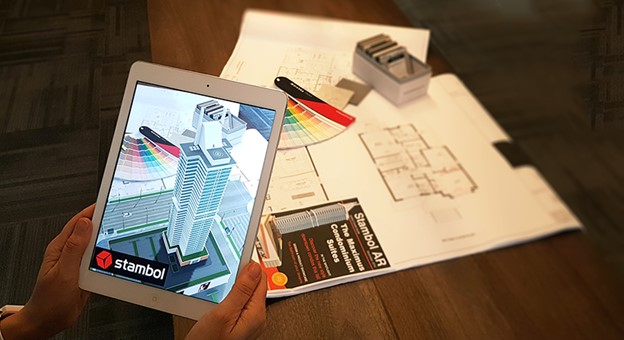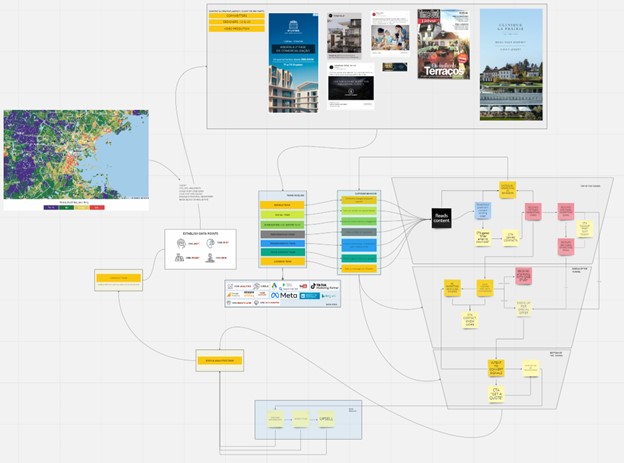7 min to read
The real estate industry has changed significantly in the last few years, with digital marketing playing an increasingly important role. With more people turning to online resources to search for a home or property, it's essential that real estate agents and professionals stay ahead of the curve by utilizing digital marketing strategies. However, many are unsure of where to start when it comes to effectively leveraging digital platforms and tools.
This article will provide a step-by-step guide on how to develop an effective digital marketing strategy for your real estate business. We'll cover topics such as setting objectives, developing content plans, optimizing websites, and tracking results so you can maximize your return on investment in no time!

What are the biggest trends of the real estate industry
At Codedesign we have several real estate clients, from Lisbon to Boston, Singapore and Dubai. This exposure means that we have been able to access and increment data into first-party and third party datacenters. Laterally we've been exploring different areas of digital marketing in order to optimize investments and acquire the right audience.

- Virtual and Augmented Reality (VR and AR): VR and AR technologies have become increasingly popular in the real estate industry. They allow potential buyers and renters to experience virtual property tours, both in-person and remotely, making the home searching process more immersive and convenient.

- Video Marketing: High-quality video content, including walk-through tours and neighborhood highlights, can be an effective way to showcase properties and build brand awareness. Leveraging platforms like YouTube, Instagram, and Facebook can help reach a wider audience.
- Artificial Intelligence (AI) and Chatbots: AI-powered chatbots can improve the customer experience by providing instant support, answering questions, and helping users navigate the property search process. This technology can also help real estate companies collect valuable data on customer preferences and behavior.
- Targeted Advertising: Utilizing advanced targeting options in advertising platforms like Google Ads and Facebook Ads allows real estate companies to reach potential clients with greater accuracy, improving the efficiency of ad spend.

Codedesign proprietary metholody for real estate
- Local SEO and Google My Business: Optimizing for local search results can help real estate companies rank higher in search engines and increase visibility to potential clients. This includes optimizing website content, keywords, and maintaining an accurate and up-to-date Google My Business profile.
- Content Marketing and Blogging: Providing valuable and informative content can help real estate companies establish themselves as industry experts, build trust with potential clients, and improve search engine rankings.

- Social Media Marketing: Engaging with audiences on platforms like Instagram, Facebook, LinkedIn, and Twitter can help real estate companies build brand awareness, showcase properties, and interact with potential clients.
- Influencer Marketing and Collaborations: Partnering with local influencers and complementary businesses can help real estate companies reach new audiences and increase their credibility in the community.
- Email Marketing and Automation: Sending personalized and relevant email campaigns can help real estate companies nurture leads and maintain relationships with existing clients.
- Analytics and Data-Driven Strategies: Utilizing data and analytics tools can help real estate companies better understand their audience, optimize marketing campaigns, and make more informed decisions about their marketing strategies.
Digital Marketing for Real Estate: The 8 Steps to Success
1. Establish Objectives
Before you begin executing any digital marketing strategies, it is important to identify the overall objectives for your business and how digital marketing can help achieve them. This could include goals such as increasing website traffic, generating leads, or building brand awareness. Make sure to be realistic when setting objectives and use data to measure success. In addition, determine how much time and budget you are willing to dedicate toward digital marketing efforts.
Also consider what aspects of digital marketing will be most beneficial to your business, such as SEO, social media, or paid search.
2. Develop Content Strategy
Content is key when it comes to digital marketing for real estate. You need to create content that appeals to potential buyers and drives them toward action. This could include blog posts about home-buying tips or guides on finding the perfect house in a certain area. Additionally, you can use visuals such as photos and videos to engage with viewers and draw attention to your offerings. Make sure to optimize all content for both desktop and mobile devices as well as local search engines in order to maximize visibility. This will help drive more traffic to your website, social media pages, and other online resources.
-
Set goals: Begin by defining your content marketing objectives. These goals could include generating leads, increasing brand awareness, establishing your company as an industry expert, or driving more website traffic. Your goals should be specific, measurable, achievable, relevant, and time-bound (SMART).
-
Define your target audience: Understand your ideal customer by creating buyer personas. Consider factors such as age, location, income, interests, and pain points. Knowing your target audience helps you create content that resonates with them.
-
Conduct keyword research: Identify relevant keywords and phrases that your target audience is likely to search for when looking for information related to real estate. Use keyword research tools like Google Keyword Planner or Ahrefs to find high-volume, low-competition keywords. Incorporate these keywords into your content to improve your search engine rankings and increase visibility.
-
Analyze your competitors: Research your competitors' content strategies to identify gaps and opportunities. Take note of their most successful content types, topics, and channels, and use this information to inform your own strategy.
-
Create a content calendar: Develop a content calendar that outlines the type of content you'll create, the topics you'll cover, and the publishing schedule. This will help you maintain a consistent content production rhythm and ensure you're covering a variety of topics that interest your target audience.
3. Optimize Your Website
In order to attract new visitors and convert them into leads or customers, you must optimize your website for search engines. This includes optimizing titles, tags, descriptions, and content with relevant keywords. Additionally, make sure that all images are optimized for SEO as well. A fast-loading website is also essential in order to keep users engaged and prevent them from leaving too soon. Mobile optimization is a must as well since many customers use their phones to search for real estate listings or agents. So a website for property managers should be accessible on any device. That way, you can make sure your business is always visible and reachable to potential customers.
4. Leverage Social Media
Social media has become invaluable in the real estate industry, allowing agents and businesses to share information with their target audience quickly. Utilizing platforms such as Facebook, Twitter, and Instagram will help you build relationships with potential buyers or sellers and spread awareness of your business. Additionally, these channels provide a great opportunity for customer service, helping you respond promptly to any inquiries or complaints. Finally, social media gives you the chance to showcase properties through photos and videos which can be more appealing than traditional text-based listings. For example, you could host a weekly “virtual open house” where viewers can tour properties without leaving their homes.
5. Track Results
It is important that you track the success of your digital marketing efforts to ensure that you are achieving the desired results. Use analytics tools such as Google Analytics to measure website traffic and conversions, and use social media insights to monitor engagement with your posts. This will help you identify which channels are driving the most leads or sales and where improvements need to be made. Additionally, tracking data over time allows you to recognize patterns and adjust your strategies accordingly for maximum success.
This will also help you determine the return on investment for your digital marketing campaigns so that you can allocate resources accordingly.
6. Invest in Paid Advertising
While organic methods are important for driving long-term success, paid advertising provides a great opportunity to reach potential customers quickly and efficiently. Investing in targeted ads on social media or search engines will help you get in front of your ideal customers with minimal effort. Additionally, many platforms allow you to target users based on their location or interests which can be extremely useful for real estate businesses. Just make sure that you are tracking the performance of each campaign so that you know what is working and what needs to be adjusted. Also, be sure to set aside a budget for paid advertising in order to maximize your return on investment.
7. Develop Partnerships
Partnerships with other real estate professionals or related businesses can be very beneficial for property managers. Connecting with local brokers, agents, and contractors will help you build credibility and visibility in the industry. It is also important that you develop relationships with local media outlets such as newspapers and radio stations in order to increase awareness of your business.
Finally, look into organizations or events that are relevant to the real estate industry and see how you can get involved or collaborate with them. By forming strategic partnerships, you can achieve better results from your digital marketing efforts while strengthening your presence in the community.
8. Monitor Trends
Finally, it is essential that you monitor the latest trends in digital marketing for real estate. By staying up to date on new technologies and strategies, you can ensure that your business stays competitive and relevant. For example, artificial intelligence (AI) has become an increasingly a popular tool for automating repetitive tasks and gaining insights from customer data. Additionally, virtual reality (VR) tours are now being used by many agents to provide potential buyers with a more immersive experience when viewing properties. Keeping tabs on these developments will help you stay ahead of the curve and give your customers the best possible service.

Digital marketing is an invaluable tool for real estate businesses to reach potential customers and build relationships with them. By leveraging the power of social media, tracking results, and investing in paid advertising, property managers can effectively increase their visibility online while forming strategic partnerships that will help strengthen their presence in the community. With these digital marketing tips, you are now better equipped to create a successful strategy that drives more leads and sales for your business. So don’t wait any longer – start optimizing your website today!

About Bruno GavinoBruno Gavino is the CEO and partner of Codedesign, a digital marketing agency with a strong international presence. Based in Lisbon, Portugal, with offices in Boston, Singapore, and Manchester (UK) Codedesign has been recognized as one of the top interactive agencies and eCommerce agencies. Awarded Top B2B Company in Europe and Top B2C company in retail, Codedesign aims to foster personal relationships with clients and create a positive work environment for its team. He emphasizes the need for digital agencies to focus on data optimization and performance to meet the increasingly results-driven demands of clients. His experience in digital marketing, combined with a unique background that includes engineering and data, contributes to his effective and multifaceted leadership style. |

About CodedesignCodedesign is a digital marketing agency with a strong multicultural and international presence, offering expert services in digital marketing. Our digital agency in Lisbon, Boston, and Manchester enables us to provide market-ready strategies that suit a wide range of clients across the globe (both B2B and B2C). We specialize in creating impactful online experiences, focusing on making your digital presence strong and efficient. Our approach is straightforward and effective, ensuring that every client receives a personalized service that truly meets their needs. Our digital agency is committed to using the latest data and technology to help your business stand out. Whether you're looking to increase your online visibility, connect better with your audience, get more leads, or grow your online sales. For more information, read our Digital Strategy Blog or to start your journey with us, please feel free to contact us. |
CodeDesign is leading:
- Digital Agency
- Digital Marketing Agency
- Digital Ecommerce Agency
- Amazon Marketing Agency

Add comment ×